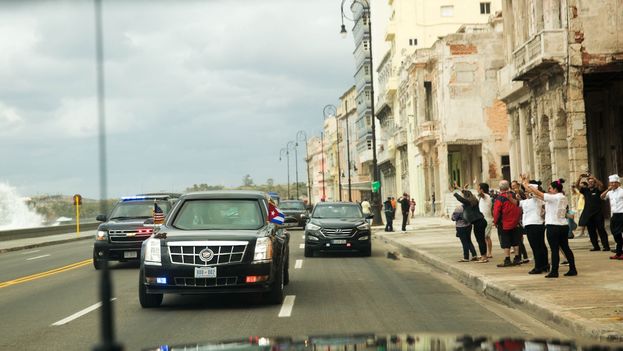
![]() 14ymedio, Carlos Alberto Montaner, Miami, 26 March 2016 – Spanish children used to play a game of imagination, listing the things carried in ships from the colonies: “A ship has come from Havana carrying: pineapples, lace, sugar,” whatever. It was a playful exercise in which fantasy and vocabulary mixed as a teaching tool.
14ymedio, Carlos Alberto Montaner, Miami, 26 March 2016 – Spanish children used to play a game of imagination, listing the things carried in ships from the colonies: “A ship has come from Havana carrying: pineapples, lace, sugar,” whatever. It was a playful exercise in which fantasy and vocabulary mixed as a teaching tool.
Barack Obama, without knowing it, revived the game. For the United States President his trip had four declared objectives: unilaterally bury the Cold War in the Caribbean; officially eliminate the diplomatic strategy of containment or isolation and replace it with one of engagement or rapprochement; reinforce ties with Cuban civil society, especially with the emerging private business sector; and strengthen the democratic opposition that seeks a peaceful evolution of the regime towards pluralism.
For the Cuban regime the visit was another step to ending the old trade embargo, and achieving the coming of American tourists and investments; the promise of soft credits when the law permits it; and the possibility of alleviating the difficult economic situation that Cuba is facing with the end of the subsidies from Venezuela, which the economist Mesa Lago has, in the past, estimated to total thirteen billion dollars a year.
Raul Castro had not the least intention of modifying his communist dictatorship. At the end of the day, as Fidel Castro himself has reiterated a hundred times, the regime established itself based on ideological convictions and not as a response to US hostility. The sequence was the inverse.
Nor is it in his plans to bury “anti-Yankeeism,” one of the central elements of 21st Century Socialism. For him, for Nicolas Maduro, for Evo Morales, even for Rafael Correa and Daniel Ortega, the Cold War is not over, as is evident in their good relations with Iran, North Korea and Syria.
For United States exporters and investors Obama’s approach was fairly tempting. Money, as we know, is cautious. They accompanied him with more curiosity than real interest. As long as the embargo law continues, any exports to Cuba must be paid for in advance, a measure healthy up to now, because the island has a bad reputation as a payer. Throughout the 57 years this government has lasted, almost every business or country that has extended it credit has been defrauded.
The only businesses that are profitable in Cuban are those engaged in tourism, because they are paid ahead of time and in dollars. Everyone also knows that it is very dangerous to do business where there are no independent courts. In Cuba, as in all totalitarian governments, the judges are an appendage of the central power.
The democrats of the internal opposition have been the main beneficiaries. There were thirteen people from diverse groups, as befits any people aspiring to respect for differences of opinion. Obama met with them for almost two hours, listened to them, supported them, and then devoted the main part of his speech to demanding that Raul Castro respect human rights and the need for plurality required by a society affected for so many years by the sclerosis of a single way of thinking. The moment when he turned to the general and told him, “do not fear the voices of Cubans who want to express themselves freely,” is and will be for a long time a landmark in the struggle against the dictatorship.
Will the strategy of engagement work? Obama himself is skeptical, and rightly so: the Cuban dictatorship is not going to change. It is proudly communist and the Constitution awards the Party exclusive leadership of society. For the dominant elite, human rights – specifically the freedom of expression and association to which Obama referred – are subterfuges of the hated bourgeoisie to extend its social control, and those who demand these rights are criminals.
In this case, is there a sense of a change in tactics? It is difficult to know at this point. For now, the dissidents are encouraged. They believe that Obama’s trip is a turning point. We wait, with fingers crossed. It is part of the game.
